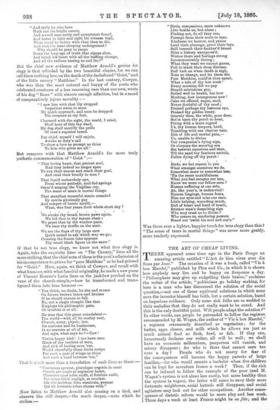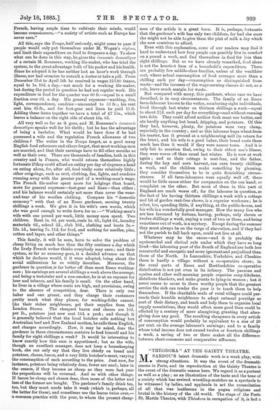THE ART OF CHEAP LIVING-.
THERE appeared some time ago in the Paris Temps an amusing article entitled " L'Art de bien vivre avec dix Sorts par Jour." The occasion of it was a book, called "Vie B. bon Marche," published by Pion and Co., in which it is shown how anybody may live and be happy on fivepence a day. "Philosophers may give up cudgelling their brains," exclaims the writer of the article, "politicians go holiday making, for here is a man who has discovered the solution of the social question,—not one of those equivocal solutions in which none save the inventor himself has faith, but a certain solution, based on imperious evidence. Only some sick folks are so wedded to their maladies that they do not really want to be cured. And this is the only doubtful point. Will people adopt the solution ?" In other words, can people be persuaded to follow the regimen recommended by M. Wogau, the author of "Vie h bon Marche," a regimen erroneously described as vegetarian ; for the butter, eggs, cheese, and milk which he allows are just as much animal food as flesh, fowl, or fish.. If they can, humorously declares our writer, all will be well ; we shall have an economic millennium, pauperism will vanish, and misery disappear ; for who is there that cannot earn ten sons a day ? People who do not marry for fear of the consequences will become the happy parents of large families,—for who would remain a bachelor when five children can be kept for seventeen francs a week ? Then, if the rich can be induced to follow the example of the poor (and M. Wogan's system is not alone less costly, but more healthy than the system in vogue), the latter will cease to envy their more fortunate neighbours, social hatreds will disappear, and social agitators may look out for other occupations. Another conse- quence of dietetic reform would be more play and less work. Three days a week at least France might be en fits; and the
French, having ample time to cultivate their minds, would become connoisseurs,—"a society of artists such as Europe has never seen."
All this, says the Temps, half seriously, might come to pass if people would only put themselves under M. Wogan's regime, and limit their expenditure on food to fivepence a day. To show what can be done in this way, he gives the economic domestigue of a certain M. Rousseau, working file-maker, who has tried the system, to the great advantage both of his pocket and his health. Since he adopted it he has neither lost an hour's work through illness, nor had occasion to consult a doctor or take a pill. From December 31st to April 5th he received in wages 213.80 francs, equal to 18. 10d. a day,—not mach for a working file-maker, but during the period in question he had not regular work. His expenditure in food for the quarter was 60 fr.—equal to a small fraction over 6d. a day. His general expenses—washing, fire, light, correspondence, sundries—amounted to 53 fr.; his rent cost him 65 fr., and for foot-gear and linen he paid 15 fr. Adding these items together we have a total of 27 15s., which leaves a balance on the right side of about 16s. 6d.
All very well so far as it goes, and M. Rousseau's economie domestigue speaks well for his thrift ; but he has the advantage of being a bachelor. What would he have done if he had possessed a wife and the regulation French allowance of two children P The writer in the Temps forgot, as a good many English food reformers and others forget, that most working-men are married, and that their earnings have to fill other mouths as well as their own. There are thousands of families, both in this country and in France, who would esteem themselves highly fortunate if they could afford an outlay per day of sixpence a head on eating alone, for, after all, food really costs relatively little ; other outgoings, such as rent, clothing, fire, lights, and sundries running away with the greater part of a working-man's wage. The French file-maker spent more for lodgings than board, more for general expenses—foot-gear and linen—than either ; and his balance would certainly not more than cover the wear- and-tear of his woollen clothing. Compare his "domestic economy" with that of an Essex gardener, earning twenty shillings a week. We give it in his wife's own words, which she was good enough to write down for us :—" Working-man's wife with one pound per week, little money soon spent. Two children. Rent 5s. 6d. per week, coals is. 6d., light 6d., laundry materials 6d., school 3d., club 10d., clothing and boots 38.— 12s. id., leaving 7s. 11d, for food, and nothing for needles, pins, cotton and tapes, and other things."
This family, it will be seen, have to solve the problem of cheap living on much less than the fifty centimes a day which the lively French writer thinks everybody may earn; and their system, so far as economy goes, is a decided advance on that which he declares would, if it were adopted, bring about the social millennium he so wittily describes. Moreover, the gardener in questionis far better off than most Essex working- men ; his earnings are several shillings a week above the average, and being a teetotaler and a non-smoker, he is at no expense for beer and tobacco, and his family is small. On the other hand, he lives in a village where rents are high, and provisions, owing to the absence of competition, dear. There is only one baker and one grocer, and they charge their customers pretty much what they please, for working-folks cannot, like their richer neighbours, get their supplies from the London Stores. The cheapest bacon and cheese are 10d. per lb., potatoes just now cost 16d. a peck; and though it is generally believed that the local butcher sells nothing but Australian beef and New Zealand mutton, he calls them English, and charges accordingly. How, it may be asked, does the gardener in these circumstances contrive to feed himself and his family for eight shillings a week P It would be interesting to know exactly how this sum is apportioned ; but as the wife, though an excellent manager, does not keep a housekeeping book, she can only say that they live chiefly on bread and potatoes, cheese, bacon, and a very little butcher's-meat, varying the consumption of each according to the price. Just now, for instance, potatoes being relatively dear, fewer are used; later in the season, if they become as cheap as they were last year the proportions will be reversed. And so with other things. If bacon be cheap and cheese dear, then more of the latter and less of the former are bought. The gardener's family drink tea, too, but they must needs take it weak (which is, perhaps, all the better for them), and sometimes use the leaves twice over,— a common practice with the poor, to whom the present cheap-
ness of the article is a great boon. It is, perhaps, fortunate that the gardener's wife has only two children, for had she more she might not be able to give them the pint of milk a day which she now contrives to afford.
Even with this explanation, some of our readers may find it hard to understand how four people can possibly live in comfort on a pound a week, and find themselves in food for less than eight shillings. But as we have already remarked, food alone is not the heaviest item of a household's expenditure. There are probably few middle-class families, unless of the wealthier sort, whose actual consumption of food averages more than a shilling each per day—consumption as distinguished from waste—and the incomes of the wage-earning classes do not, as a rule, leave much margin for waste.
But compared with many, this gardener, whose case we have described, is in easy circumstances. The family of an Essex farm-labourer known to the writer, numbering eight individuals, lived through last winter on thirteen shillings a week—equal to about 21d. each per day for everything—and without running into debt. They could afford neither flesh meat nor butter, and ate hardly anything but bread, dripping, and potatoes. Of this they had, however, plenty, for potatoes were very cheap, especially in the country ; and as this labourer buys wheat from his master, has it ground at a neighbouring mill (in return for the bran), and his wife is a good baker, their bread costs them much less than it would if they were nearer town. And it is only fair to mention that, owing to their eldest son's illness, they were worse off than usual last winter. He is now at work again ; and as their cottage is rent-free, and the father, during the hay and corn harvest, can earn twenty shillings a week, and the children make something by gleaning, they consider themselves to be in quite flourishing circum- stances. If all farm-labourers were equally well off, there would be little cause either for compassion on the one hand, or complaint on the other. But most of them in this part of England are much worse off; for the labourer in question, as the fact of his having thirteen shillings a week with a cottage and bit of garden rent-free shows, is a superior workman ; he is sober, too, spending little, if anything, at the public-house, and his wife is a wonderfully good manager. How the many live who are less favoured by fortune, having, perhaps, only eleven or twelve shillings a week, paying a rent of two or three, and being sometimes out of work, is a mystery. Except during the summer they must always be on the verge of starvation, and if they had not the parish to fall back upon, could not live at all.
Whatever may be the cause—and it is probably the squirearchal and clerical rule under which they have so long lived—the labouring poor of the South of England are both less resourceful and energetic and more ignorant and prejudiced than those of the North. In Lancashire, Yorkshire, and Cheshire there is hardly a village without a co-operative store; in the rural parts of Essex and Hertfordshire co-operative distribution is not yet even in its infancy. The parsons and squires and other well-meaning people organise soup-kitchens, distribute blankets, and make grants to lying-in'women ; but it never seems to occur to these worthy people that the greatest service the rich can render the poor is to teach them to help themselves. If the charitable souls of rural villages could per- suade their humble neighbours to adopt oatmeal porridge as part of their dietary, and teach and help them to organise local supply associations, they would effect more good than could be effected by a century of mere almsgiving, granting that alms- giving does any good. The resulting cheapness in every article of consumption would probably be equivalent to a rise of 20 per cent, on the average labourer's earnings ; and to a family whose total income does not exceed twelve or fourteen shillings a week, a saving of two or three makes all the difference between short-commons and comparative affluence.



































 Previous page
Previous page